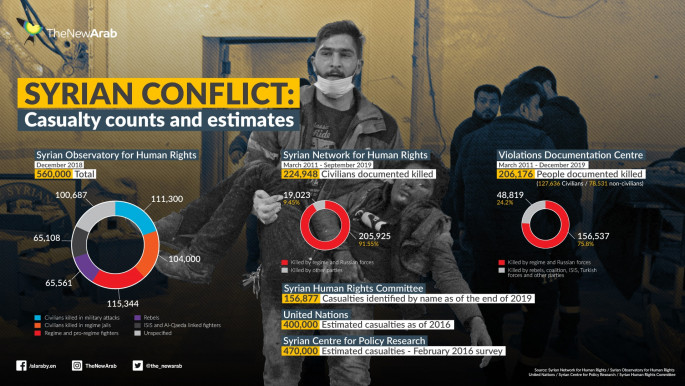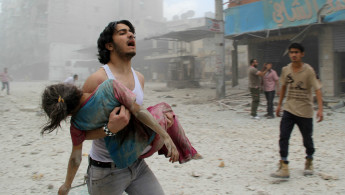UN refuses to directly blame Russia for Syria hospital attacks
A UN board of inquiry investigating attacks on civilian establishments in Syria, including hospitals, has refrained from directly holding Russia responsible, according to a summary of its report published Monday.
The coordinates of the sites had been communicated to the belligerents by the UN to protect them from air strikes.
Without mentioning Russia, the investigation concluded that in four out of the seven cases studied by the board - a school, a health centre, a surgical hospital and a protection center - "the government of Syria and/or its allies had carried out the airstrike."
In 2019, The New York Times published an exhaustive investigation, notably including recordings of Russian pilots that directly incriminated Moscow in attacks on hospitals in Syria.
"The refusal to explicitly name Russia as a responsible party working alongside the Syrian government... is deeply disappointing," Human Rights Watch said after the summary was published.
The UN commission chose seven cases, but its investigators were unable to visit the sites as the Syrian regime did not grant visas.
The cases included the Martyr Akram Ali Ibrahim Al-Ahmad school in Madiq Castle on April 2018, 2019, and the Rakaya Sijneh health centre on 3 May.
There were no victims in either case. The report said it was highly likely the raids were conducted by the Assad regime or its allies.
|
||
The commission also looked at the Kafr Nabutha health centre (7 May), which had no victims and was also likely conducted by Syria and its allies.
Denials from Moscow
A 14 May raid on the Nayrab Palestinian refugee camp, in Aleppo, resulted in 10 deaths and about 30 people injured, and was likely carried out by the Syrian branch of Al-Qaeda, the report said.
The Kafr Nobol surgical centre (4 July) attack had no victims, and its coordinates were given to Russia. The Ariha protection centre attack (28 July) resulted in a few people injured, and its coordinates were also given to Russia.
The report found it was highly likely that both raids were conducted by the Syrian regime or its allies.
Moscow, the Damascus regime's main political and military supporter, has denied that its aircraft targeted civilian sites.
The summary was prepared by UN Secretary General Antonio Guterres on the basis of a 185-page confidential internal report, with 200 annexes.
The summary was submitted to the UN Security Council's 15 members.
Guterres attributed the small number of incidents examined to the absence of UN personnel on the ground, which made it difficult to determine what had happened.
At the end of July 2019, ten Security Council members issued a rare demarche - a formal diplomatic petition - demanding that Guterres open an investigation into air strikes on medical installations, infuriating Russia.
The board of inquiry was established in September and its report was supposed to have been submitted by the end of 2019, but was delayed until March.
Western countries for months have demanded that a summary of the report be published, but that too was delayed until now.
Guterres stressed that the board of inquiry was not a criminal investigation and that its aim was to improve UN procedures and prevent attacks of this kind in the future.
Several western countries and NGOs have argued that air strikes on civilian targets in Syria should be prosecuted as war crimes.
The summary added that multiple member states agreed to provide crucial information for the report, including military sources.
But only four states actually provided such information, which was limited in scope. The report did not identify which states had offered to cooperate or actually participated.
Follow us on Facebook, Twitter and Instagram to stay connected





 Follow the Middle East's top stories in English at The New Arab on Google News
Follow the Middle East's top stories in English at The New Arab on Google News
![Israeli forces ordered bombed Gaza's Jabalia, ordering residents to leave [Getty]](/sites/default/files/styles/image_330x185/public/2176418030.jpeg?h=a5f2f23a&itok=_YGZaP1z)

